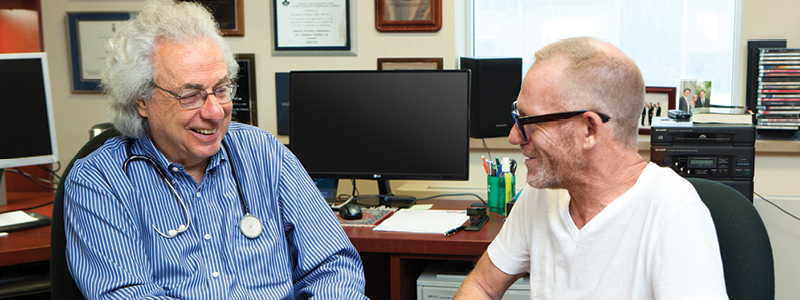Diabetes study continues to transform care
About Us

 Above: Patient Lorne and Dr. Bernard Zinman
Above: Patient Lorne and Dr. Bernard Zinman
It was the early 1980s and debate raged in the Type 1 diabetes community as to the cause of long-term complications associated with the disease, including eye, kidney and cardiovascular conditions.
One theory held that complications were the result of poorly controlled blood sugar levels among people with Type 1 diabetes. The grounds for this being that, by and large, patients with good control developed fewer complications. Another theory held that a patient’s blood sugar level didn’t matter — that, in fact, one’s genetic susceptibility to developing complications was of paramount importance. The evidence for this was that some people with very poor control didn’t develop complications at all.
Dr. Bernard Zinman, director of the Leadership Sinai Centre for Diabetes, and collaborators from 27 other North American centres settled the debate through their Diabetes Control and Complications Trial (DCCT). Led by Dr. Zinman, the international study proved in 1993 that tightly controlling blood sugar through intensive insulin therapy is the best way to prevent complications. Intensive therapy quickly became the standard of care around the world.
“The DCCT has had a huge impact on the lives of people with Type 1 diabetes. The life expectancy of someone with Type 1 diabetes who maintains excellent blood sugar control is now the same as someone without diabetes. That’s incredible.”
— Dr. Bernard Zinman, Director of the Leadership Sinai Centre for Diabetes; Associate Director, Clinical Research, LTRI; The Stephen and Suzie Pustil Diabetes Research Scientist; The Sam and Judy Pencer Family Chair in Diabetes Research
The DCCT and its ongoing followup study — known as Epidemiology of Diabetes Interventions and Complications (EDIC) — have continued to produce new insights that shape care and treatment.
Lorne Shiff, a Type 1 diabetes patient of Dr. Zinman’s since 1981, is one of the original 1,441 DCCT participants. Managing his disease requires constant vigilance. “Type 1 diabetes is a 24/7, 365 day-a-year disease. You never have one minute off,” he says. It is Lorne’s vigilance in the face of his disease that has made him such a strong supporter of Sinai Health’s diabetes research, noting that “it’s great to know this study has advanced treatment of Type 1 diabetes globally.”
When the DCCT study ended and all participants switched to intensive therapy, Dr. Zinman and colleagues established the EDIC study to observe participants’ health over a longer timeframe. In EDIC results published in 2013, researchers found that the former intensive therapy group had a much lower risk of cardiovascular complications — which are the deadliest of diabetes’ complications. Intensive therapy also reduced the group’s risk of major cardiovascular events by 42 per cent compared to the former conventional therapy group, and reduced the risk of heart attack and stroke by 58 per cent.
The cardiovascular benefits of intensive therapy could potentially be enhanced through the supplemental use of a newer Type 2 diabetes drug called Empagliflozin. In a separate study led by Dr. Zinman, researchers found in 2015 that Empagliflozin reduced the risk of death from cardiovascular causes by 38 per cent among Type 2 diabetes patients, compared to patients who didn’t receive Empagliflozin. Dr. Zinman’s colleague, Dr. Bruce Perkins, is now studying the drug as a supplement to insulin treatment among Type 1 patients. Empagliflozin is the first and only diabetes drug on the market today that reduces the risk of death from diabetes-associated heart failure.
Meanwhile, as EDIC’s dedicated participants begin to approach their golden years, researchers will investigate whether Type 1 diabetes affects their memory, attention, language and other cognitive abilities. The changing nature and ongoing impact of EDIC are some of the reasons participants have remained involved for so long, says Lorne. “The hope is that this study will never end, until we’re all gone,” he says with a chuckle.”